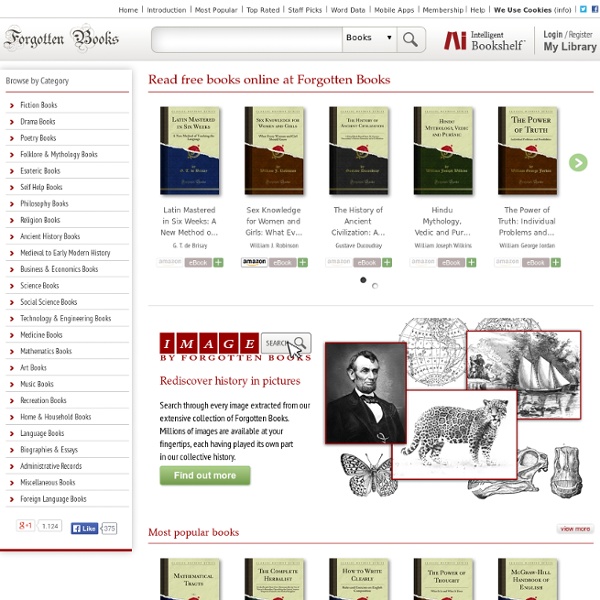



Banned Books Online presents Welcome to this special exhibit of books that have been the objects of censorship or censorship attempts. The books featured here, ranging from Ulysses to Little Red Riding Hood, have been selected from the indexes of The Online Books Page. (See that page for more than 3 million more online books!) Please inform onlinebooks@pobox.upenn.edu of any new material that can be included here. Note that the listings are meant to be representative rather than exhaustive. October 1 - 7 is Banned Books Week. Books Suppressed or Censored by Legal Authorities Ulysses by James Joyce was selected by the Modern Library as the best novel of the 20th century, and has received wide praise from other literature scholars, including those who have defended online censorship. In 1930, U.S. John Cleland's Fanny Hill (also known as Memoirs of a Woman of Pleasure) has been frequently suppressed since its initial publication in 1749. The Comstock law also forbade distribution of birth control information.
The Occult - Occultopedia: The Occult and Unexplained Encyclopedia ERIC - Education Resources Information Center Interpretation of a Horoscope by Marc Edmund Jones | Sabian Astrology by Marc Edmund Jones A Note of Explanation The article that follows is based on a talk Marc Jones gave for "The Guild" in 1942. It was subsequently published in the April issue of "The Astrological Review" that same year. The Sabian symbols used for this talk were taken from Marc's 1931 mimeograph lesson set on Symbolical Astrology. The chart of Theodore Roosevelt that was used to illustrate his talk is included here below. The "15 point analysis" set forth in this talk was revised years later and published as a "Sixteen-Point Analysis" in Marc Jones' 1960 book, The Essentials of Astrological Analysis. How to Proceed After Getting an Overview of the Chart MADAME PRESIDENT, MEMBERS AND FRIENDS: As announced in the Guild program, this is not supposed to be a talk in the ordinary sense of the word. The fifteen-point method of interpretation is absolutely dependable when we have an exact birth hour. Cuvier once remarked: "Show me a bone and I will identify the animal." No. 1 No. 2 No. 3 No. 4 No. 5
The Book of Talismans Amulets and Zodiacal Gems Thomas Pavitt Resistance 2010 The Divine Pymander: Hermes Trismegistus, His First Book Sacred Texts Esoteric Index Previous Next Buy this Book at Amazon.com The Divine Pymander, by Hermes Mercurius Trismegistus, tr. by John Everard, [1650], at sacred-texts.com 1. O MY SON, write this First Book, both for Humanity's sake, and for Piety towards god. 2. 3. 4. 5. 6. 7. 8. 9. 10. 11. 12. 13. 14. 15. 16. 17. 18. 19. 20. 21. 22. 23. 24. 25. 26. 27. 28. 29. 30. 31. 32. 33. 34. 35. 36. 37. 38. 39. 40. 41. 42. 43. 44. 45. 46. 47. 48. 49. 50. 51. 52. 53. 54. 55. 56. 57. 58. 59. 60. 61. 62. 63. 64. 65. 66. 67. 68. 69. 70. 71. 72. 73. 74. 75. 76. 77. 78. 79. 80. 81. 82. 83. 84. 85. 86. 87. 88. The End of THE FIRST BOOK OF HERMES.... Next: The Second Book, Called, Poemander
Perseus Digital Library Language of Branches We are like these men sitting in the cave; at this moment we only see the shadows. We don't see the real things; we see only reflections. The same situation exists with the Language of the Branches. 550 Free eBooks: Download Great Books for Free Download 800 free eBooks to your Kindle, iPad/iPhone, computer, smart phone or ereader. Collection includes great works of fiction, non-fiction and poetry, including works by Asimov, Jane Austen, Philip K. Dick, F. Scott Fitzgerald, Neil Gaiman, Tolstoy, Dostoevsky, Shakespeare, Ernest Hemingway, Virginia Woolf & James Joyce. Also please see our collection 1,000 Free Audio Books: Download Great Books for Free, where you can download more great books to your computer or mp3 player. Learn how to load ebook (.mobi) files to your Kindle with this video Religious Texts Assorted Texts This list of Free eBooks has received mentions in the The Daily Beast, Computer World, Gizmodo and Lifehacker.
Life-Changing Books: Your Picks We asked our readers what books made the biggest difference in their lives, and here’s what they had to say. The list below tells you what books shaped their lives and why. 1984 – George Orwell 1984 “was the first book I actually enjoyed reading. A Short History of Nearly Everything – Bill Bryson “Wow this book is incredible. Ariel – Sylvia Plath “After reading through these suggestions, I realized there’s a big hole: Poetry! Cat’s Cradle – Kurt Vonnegut “This book reignited the pilot light of my imagination like no other book had done in quite awhile. Crooked Cucumber – The Life and Zen Teaching of Shunryu Suzuki “Although I am not practicing Zen (yet), this book is like my Bible in that I plan to always read over it and reflect upon the messages therein. Disturbing the Peace – Vaclav Havel “I read it as a junior in high school, picked up on the bargain pile at a B. Extremely Loud and Incredibly Close – Jonathan Safran Foer Great Expectations – Charles Dickens Hiroshima – John Hersey –“Epic.